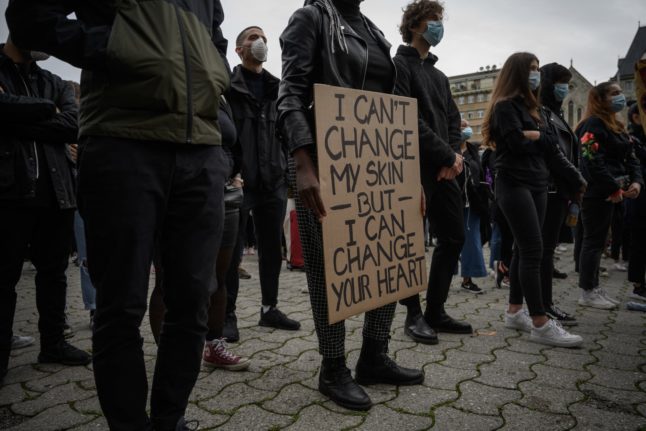Over three-quarters of respondents to the survey indicated that they had experienced xenophobia or racism in the country – although some insisted the vast majority of people in the country were welcoming
Just under one quarter of respondents replied they had never experienced any racism or discrimination.
According to figures released in February by the government’s Service for Combating Racism more than 17 percent of Switzerland’s population with a migrant background were the main targets of racism in Switzerland.
READ ALSO: Are foreigners in Switzerland likely to experience some form of racism?
A ‘very Xenophobic’ Switzerland?
In describing how they had experienced xenophobia in the country, there was a distinction between what readers perceived as institutional – that is to say, on a societal scale – and in their daily lives.
Some readers described how they felt Switzerland was unfriendly on an administrative level.
Matthew, 36, an American living in Geneva states; “The requirements for non-EU residents of Switzerland are impossibly hard, in order to secure Permit Cs or even Permit Bs.
“However they’re handed out with much lighter conditions to EU nationals. The distinction is only made on the basis of nationality.”
Read More: What language tests for permits and citizenship does Switzerland impose?
Prasant, an Indian from Zurich responded: “Car insurance discriminates in terms of pricing, based on nationalities.”
Unlike in the European Union, Swiss insurance companies are permitted to adjust policy costs based on the holder’s country of origin. Companies justify these price increases based on traffic safety data sourced from different nations.
Read More: Why foreigners in Switzerland pay higher car insurance premiums
Other readers felt that the Swiss job market was discriminatory.
Reto, who is Middle Eastern and lives in Zurich, said: “The job market in CH is very xenophobic. It doesn’t matter how long you live in Switzerland, or how much experience you have in Swiss companies.
“In many cases there is a request for native German speakers, which is actually a request for native employees. So even if you know German your application will be ignored,” Reto said.
“Swiss society is very xenophobic. One of the major issues with this situation is that they ignore the problem and refuse to deal with it. “Racism is not part of Swiss culture” I was once told, hence they don’t fight it,” Reto added.
Another reader, who asked not to be named, agreed: “I had to take my picture off my cv to be invited for interviews. Before that I was rejected without reason.”
Their experiences are somewhat backed up by the data. A 2021 study by the Swiss National Science Foundation found that foreigners were 6.5 percent less likely to be asked for a job interview.
Read More: Jobs in Switzerland: Foreigners ‘less likely to be hired than Swiss nationals’
‘Derogatory and unwelcoming’
Other readers described their personal experiences with racism and xenophobia in Switzerland.
Tom, 44, a Briton living in Zug, said: “I have experienced two cases of xenophobia from others. Both cases have been from native Swiss who have have told me to go back to my own country.
“One was an elderly lady, the other a male around early 40s who actually told me to go back to America – for some reason he thought I was an American citizen!”
Tom added: “The vast majority of people I’ve met or interacted with have been pleasant and as far as the Swiss go, been welcoming.”
Amanda, 42, an American in Aargau responded: “Stereotypes from the US are heavily joked about and poked at by the Swiss.
“Many times rightfully so, but sometimes its straight out rude. Also, my accent makes them believe I’m Dutch because no American could speak a Swiss language,” she said.
Chloe, who is half-Indian and who lives in Zurich, went into more detail about her daily experiences. She felt people refusing to respond to her in English was a sign of racism.
“The basic, almost daily type of racism I encountered living in Zurich was people refusing to talk to me in English. They just refused to,” she said.
“They just would not help a ‘foreigner’ be it at the bakery, the supermarket, wherever. I found this treatment more from less educated people.
“I am Swiss (with an Indian parent) but I look more exotic and this was not welcomed in Zurich.”
Others described examples of xenophobic attitudes in their daily lives.
An anonymous respondent from an Asian background replied: “My looks are made fun of, and I’m teased for speaking English.”
Matt, a Brit added: “I’ve seen people refused house rentals, racism in the workplace and workmen quoting higher prices for foreigners.”
Worryingly, these experiences are only just now starting to be noticed by Swiss authorities. It wasn’t until 2022, for example, that the federal government acknowledged that ‘systemic racism’ existed in the country.
Not all respondents had negative experiences.
Gergely, a Hungarian resident said: “Other than my one bad experience in 17 years (being told to go home by a man at Zurich airport), my general experience is that the Swiss are very inclusive and welcoming towards foreigners, so all in all, I’m very positive.”
One anonymous American reader said: “My experience is that the Swiss in general are wonderfully open to interacting with me. They are friendly, kind, and helpful. I have only met a few people who were openly racist or xenophobic.”
What are your experiences of racism and xenophobia in Switzerland? Have you been discriminated against because your background? Tell us about it in the comments.



 Please whitelist us to continue reading.
Please whitelist us to continue reading.
Member comments